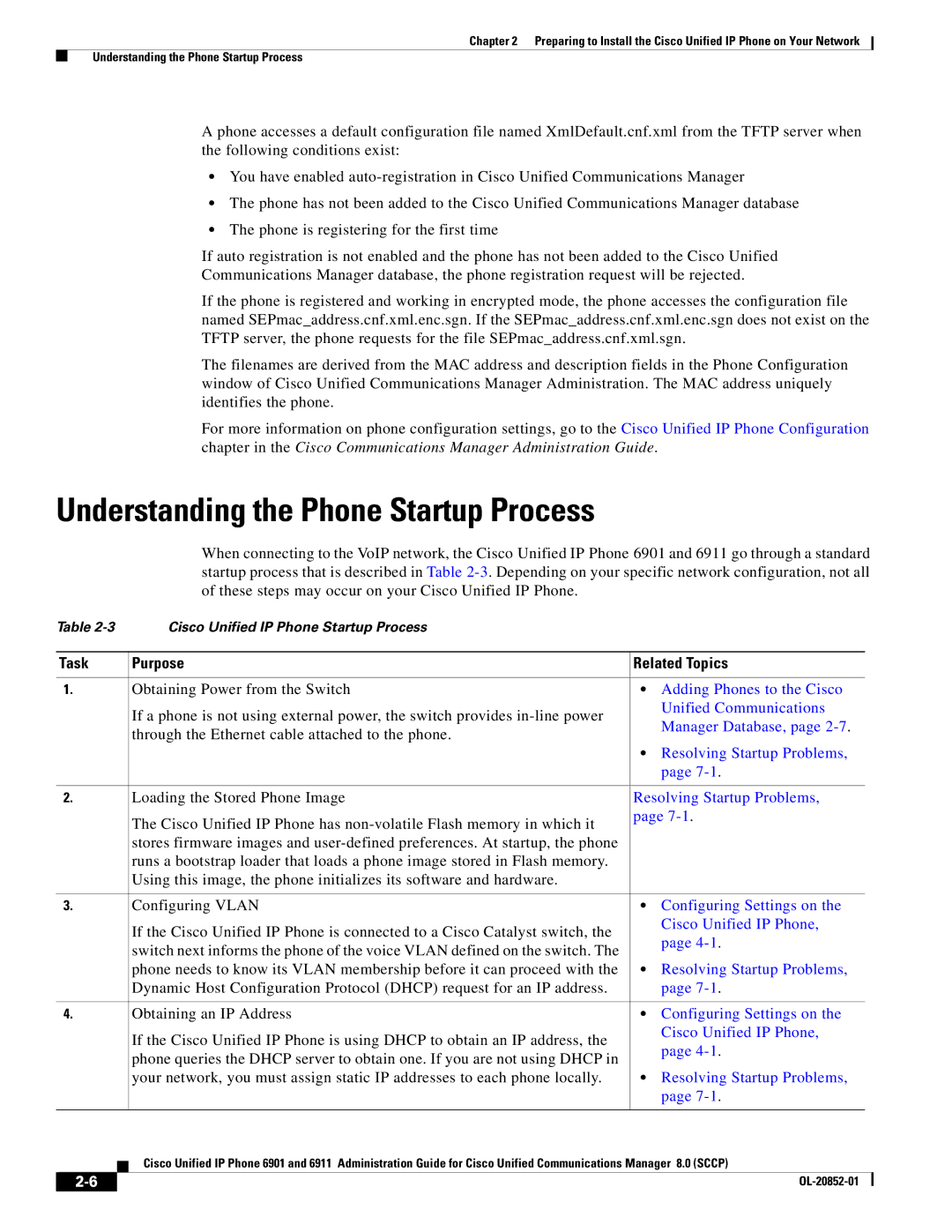
Chapter 2 Preparing to Install the Cisco Unified IP Phone on Your Network
Understanding the Phone Startup Process
A phone accesses a default configuration file named XmlDefault.cnf.xml from the TFTP server when the following conditions exist:
•You have enabled
•The phone has not been added to the Cisco Unified Communications Manager database
•The phone is registering for the first time
If auto registration is not enabled and the phone has not been added to the Cisco Unified
Communications Manager database, the phone registration request will be rejected.
If the phone is registered and working in encrypted mode, the phone accesses the configuration file named SEPmac_address.cnf.xml.enc.sgn. If the SEPmac_address.cnf.xml.enc.sgn does not exist on the TFTP server, the phone requests for the file SEPmac_address.cnf.xml.sgn.
The filenames are derived from the MAC address and description fields in the Phone Configuration window of Cisco Unified Communications Manager Administration. The MAC address uniquely identifies the phone.
For more information on phone configuration settings, go to the Cisco Unified IP Phone Configuration chapter in the Cisco Communications Manager Administration Guide.
Understanding the Phone Startup Process
When connecting to the VoIP network, the Cisco Unified IP Phone 6901 and 6911 go through a standard startup process that is described in Table
Table | Cisco Unified IP Phone Startup Process |
|
|
|
|
| |
Task | Purpose | Related Topics | |
|
|
| |
1. | Obtaining Power from the Switch | • Adding Phones to the Cisco | |
| If a phone is not using external power, the switch provides |
| Unified Communications |
|
| Manager Database, page | |
| through the Ethernet cable attached to the phone. |
| |
|
|
| |
|
| • | Resolving Startup Problems, |
|
|
| page |
|
|
| |
2. | Loading the Stored Phone Image | Resolving Startup Problems, | |
| The Cisco Unified IP Phone has | page | |
|
|
| |
| stores firmware images and |
|
|
| runs a bootstrap loader that loads a phone image stored in Flash memory. |
|
|
| Using this image, the phone initializes its software and hardware. |
|
|
|
|
| |
3. | Configuring VLAN | • Configuring Settings on the | |
| If the Cisco Unified IP Phone is connected to a Cisco Catalyst switch, the |
| Cisco Unified IP Phone, |
|
| page | |
| switch next informs the phone of the voice VLAN defined on the switch. The |
| |
|
|
| |
| phone needs to know its VLAN membership before it can proceed with the | • | Resolving Startup Problems, |
| Dynamic Host Configuration Protocol (DHCP) request for an IP address. |
| page |
|
|
| |
4. | Obtaining an IP Address | • Configuring Settings on the | |
| If the Cisco Unified IP Phone is using DHCP to obtain an IP address, the |
| Cisco Unified IP Phone, |
|
| page | |
| phone queries the DHCP server to obtain one. If you are not using DHCP in |
| |
|
|
| |
| your network, you must assign static IP addresses to each phone locally. | • | Resolving Startup Problems, |
|
|
| page |
|
|
|
|
Cisco Unified IP Phone 6901 and 6911 Administration Guide for Cisco Unified Communications Manager 8.0 (SCCP)
| ||
|
